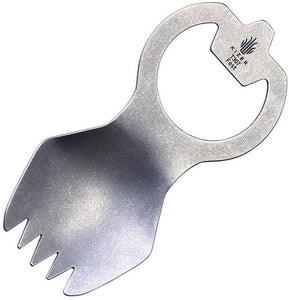I have an affinity for sporks. They are multifunctional by definition, but often misunderstood. I would like to share some of my understandings of the implications of sporks, but you may have to wait a bit for clear relevance, dear reader.
Sporks have qualitatively different configurations. The most basic distinction is whether or not the spork is one thing or two things simply connected. There are many sporks that are just forks getting the wrong end of the stick: some implement with a spoon or knife at one end, and a fork at the other. If the spoon is on the other end from the forky end, I'm not sure how you can call it a spork, but you can take that up with the sellers. In fact, the most common kind of spork found at the counters of places like EMS is the plastic, two ended spork:

These often have a serrated end on an edge of one of the tines of the forky side that enable people to tout this as a 3in1 object. With just a little thought, however, you can understand that we almost never cut a piece of food without something else holding it down, otherwise the knife will not get enough traction to actually cut. So having one item that cuts with nothing else to hold it is an idea for marketing and not for practicality. If it's a soft enough item to be cut by this thing singlehandedly, you would be able to use just the edge of the fork, like we all do at dinnertime. And also, it the knife were sharp enough to do any real damage on its own, who would want to stick it in their mouth much?
These two-faced sporks come in many sizes, most recently made popular in trendy stores in their teeny bamboo incarnation. They are also found in titanium and steel and compostable somethingorother.
The other configuration that I find truer to the concept of the merging of spoon and fork, is an item that has both of them on the same end of the stick.





This design concept is endorsed by the Museum of Modern Art and their artistic codification of spork:
Sporks, moreso than single purpose cutlery, usually have a fairly specific purpose in mind. There are pasta sporks, camping sporks, purse sporks, sporks specifically for cat food cans (o yes), serving sporks, sporks only good to look at, and sporks good for nothing. Paradoxically, while they are often for a particular purpose, they are by definition multifunctional, so can get carried away with being so many things. It is not uncommon at all for sporks to also have features including bottle openers, screwdrivers, wrenches, knives, clips, can openers, and so on. This sometimes results in an object that I'm not sure I would put in my mouth for fear of injury, but sporks are conceptual items.





Sporks are compromises. The tines of the forky part are often stubby, the spoony part too shallow, or the handle is awkward. All this is in service to the practicality and simplicity of sporkness: the ounce saved from the backpack, the one less item to worry about, the radical downsizing of life in which we are prepared, at any moment, to face the zombie apocalypse with only what we have in our pocket.
Now that I have desensitized you to the wild idea that is the spork and why anyone might be interested in them, I will risk showing you my collection/research.
Are you ready, dear reader? Have you stayed with me for the turn? Did you see it coming? Sporks are like retirements!
Like sporks, retirements are compromises of economics, relations, and realities. They are both cumbersome and odd until you get used to them. Finding the right one requires some effort and discernment of what they heck they are for. They can be designed to do more than is reasonable to actually use. (Are you really going to travel to Nepal?) And here is the final horrible reality of sporks and retirements. You may not actually need them at all.

























